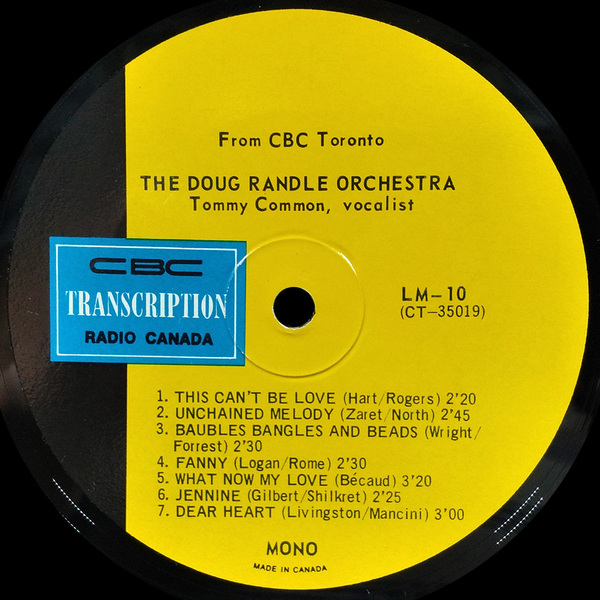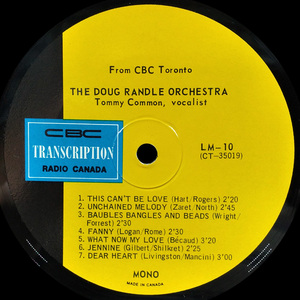Information/Write-up
Doug Randle (1928–2013) was a Canadian composer, arranger, conductor, and songwriter whose career bridged jazz, television, advertising, and socially conscious pop. He began his musical life in Calgary, Alberta, where his talents as a pianist and arranger rooted him firmly in the Canadian jazz scene of the 1950s. His sophisticated orchestrations and sharp musical instincts quickly earned him respect among peers and steady work in clubs and studios, where he developed a reputation for blending wit, craftsmanship, and technical brilliance.
In the early 1960s Randle moved to England, where he expanded his skills as an arranger for major broadcasters and conductors, including Wally Stott (later Angela Morley) and Peter Knight. He contributed to BBC productions during this period, absorbing the polished sound of British orchestral pop and light music that would leave a deep impression on his later work. Returning to Canada in 1966, he settled in Toronto and became a staff composer and arranger at the Canadian Broadcasting Corporation (CBC). There he wrote for television musicals and variety shows, crafted jingles, and orchestrated music for programs such as The Friendly Giant. His ability to balance sincerity and accessibility made him a trusted figure in the CBC’s creative circle.
In September 1970 Randle entered the CBC studios to record what would become his most ambitious work, Songs for the New Industrial State. Released in 1971 in a small run of just 500 copies on Kanata Records, the album slipped almost immediately into obscurity due to poor distribution, but it stands today as one of the most unusual and prescient records ever produced in Canada. Conceived as “a stunning collection of new songs for and about the time we live in,” the album addressed themes of corporate greed, consumerism, environmental decay, advertising, and mid-life anxieties. Randle himself described the pieces as “my bitter and twisted Simon & Garfunkel songs,” acknowledging the sardonic edge that ran through his writing.
What made the record extraordinary was its unlikely hybrid of styles: lush sunshine pop vocals sung by Tommy Ambrose and Laurie Bower, rich orchestral arrangements drawn from Randle’s experience in advertising and television, and biting lyrics that deconstructed the very tools of manipulation he once used in jingles. Songs like Colored Plastics and Vive La Company offered satirical portraits of conformity and corporate ambition; Nicolston Dam reflected on natural beauty against industrial progress; One Way Swimming imagined an escape from modern life through surreal imagery; and the album closed with Life Will Be Worth Living After All, a note of optimism that revealed Randle’s balance between cynicism and hope.
The album was recorded with some of Toronto’s finest session musicians, including Moe Koffman, Rob McConnell, Guido Basso, and Peter Appleyard, giving it a polished yet adventurous sound. Though largely ignored upon release, it became a sought-after rarity among collectors and was finally reissued by Light in the Attic Records in 2009, earning international acclaim and comparisons to David Axelrod’s Capitol productions and the harmony pop of The Free Design. Critics praised its singular vision, with Pitchfork describing it as “a work of singular vision that earns its second airing through Randle’s inventive sense of arrangement and to-the-point honesty.”
Randle continued to work as a composer and arranger throughout his life. In his final years he began a new project, The Day Fats Waller Died, featuring his daughter Joanne Randle on vocals and musical direction by the acclaimed Vancouver jazz pianist Ross Taggart. Recorded with top Canadian jazz players including Campbell Ryga and Brad Turner, the album was intended for release in 2013–14, though Randle passed away before its completion.
Though his career spanned many different corners of Canadian music, from jazz to jingles to television, Doug Randle is remembered most for one brilliant and unexpected masterpiece. Songs for the New Industrial State has endured as a rare and visionary statement, its themes of commerce, environment, and personal struggle as relevant today as they were in 1970. Randle’s music remains a testament to the possibilities of approaching popular song with both beauty and uncompromising honesty.
-Robert Williston
Pearson "Skip" Beckwith: bass
Donald [Don] Vickery: drums
Brian Browne: piano
Tommy Common: vocals
Sound files and scans courtesy of Canadian Cult Classics (https://youtube.com/@Canadian_Cult_Classics)


No Comments